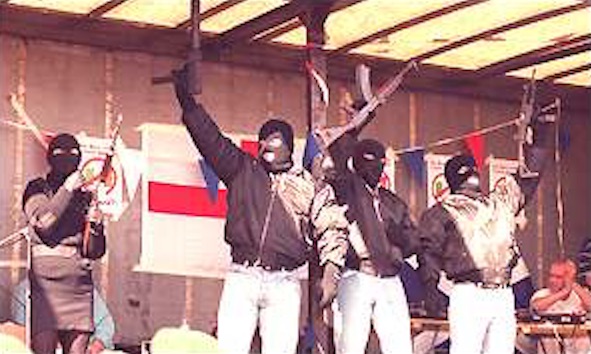
Loyalists paramilitaries are acting in concert with hardline Brexiteers to try to intimidate the European Union with the potential of violence in the north of Ireland.
The Loyalist Communities Council, which represents the UVF and UDA paramilitary groups, wrote to British Prime Minister Boris Johnson this week to announce that they were “withdrawing their support” for the 1998 Good Friday Agreement and its political institutions.
The UDA/UVF letter to Johnson said they were withdrawing their support for the peace deal “until our rights under the Agreement are restored”.
That is understood to be a reference to their claimed “right” to veto political change, including new safety inspections of meat and other Brexit-related checks on trade at ports in Larne and Belfast.
It comes amid increasing tension over a loyalist campaign against those deemed to be behind the new regulations on trade across the Irish Sea. More loyalist graffiti and banners denouncing the ‘Irish Sea Border’ have appeared across the North, many of which are threatening.
The letter argues the Irish protocol of the Brexit deal “gives effect to the Irish nationalist position at the expense of the unionist position” and warned that this “undermines the basis on which the Combined Loyalist Military Command agreed their 1994 ceasefire”.
It adds, ominously: “If the EU is not prepared to honour the entirety of the [Good Friday Agreement] then it will be responsible for the permanent destruction of the agreement.”
In practical terms, the threat to end UDA/UVF support for the peace process means little in the context of their ongoing and indiscriminate violence.
More disturbing is the fact that the letter was accorded the status of a diplomatic intervention by the British establishment.
The British Direct Ruler Brandon Lewis himself treated the UDA and UVF paramilitaries as virtual dignitaries, describing a recent meeting with their representatives as “important” and a chance to “talk to people across communities”.
His officials met with the group less than a fortnight after its drug-dealing gangs shot up two homes and a mob invaded an estate to intimidate the family of a murdered rival.
The sympathetic nature of media coverage accorded to the loyalist umbrella group also contrasted sharply with the treatment of moderate republican parties and organisations.
One young loyalist paramilitary was gently interviewed and thanked on Newstalks’s Pat Kenny Show after he made direct threats against nationalist politicians, including Tánaiste Leo Varadkar. He described a range of political parties as “legitimate targets” because of their support for the Protocol, without criticism from the interviewer.
Few in the British political establishment have challenged the statements of the LCC group, and they were even defended by the PSNI police chief Simon Byrne who branded their statement a “political move”.
Instead, the implied threat of violence should have raised questions about revoking the release licence of the former UDA and UVF prisoners who are still active within those organisations.
But Byrne, who has presided over the intense oppression of the nationalist community and has previously vowed to ‘go after’ the families of republican activists and remove their children, said the PSNI were “prudently looking at an assessment of what [the letter] means in terms of a policing response”.
Sinn Féin’s response was cautious but critical. The party’s deputy First Minister Michelle O’Neill questioned the ongoing existence of the loyalist groupings.
“I think the question that needs to be answered is, 23 years after the Good Friday Agreement, why loyalist paramilitary groups still exist, way they’re still carrying out organised crime, racketeering and extortion, holding communities to ransom,” she said.
“I think everybody in political leadership has a responsibility to encourage and to tell these groups to leave the stage. There is no place for them in today’s society.”
![[Irish Republican News]](https://republican-news.org/graphics/title_gifs/rn.gif)
![[Irish Republican News]](https://republican-news.org/graphics/title_gifs/harp.gif)

